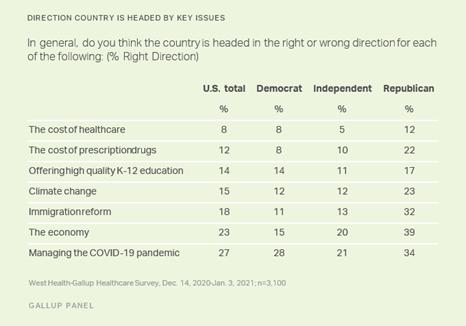New West Health-Gallup survey finds new president faces a frustrated public reeling from pandemic, economic disruption and high healthcare costs

Credit: West Health-Gallup Healthcare Survey
WASHINGTON, D.C. and SAN DIEGO, CA — In his inaugural address, President Joe Biden vowed that “help is on the way” to a nation grappling with a pandemic that has already claimed over 420,000 lives and counting. However, despite the promise of a better future, a new survey from West Health and Gallup finds Americans remain largely skeptical that issues as varied as managing the COVID-19 crisis, lowering healthcare costs, improving the economy, fixing immigration and addressing climate change, will improve anytime soon.
The findings from the monthly West Health-Gallup U.S. Healthcare Study are based on a nationally representative sample of 3,100 U.S. adults interviewed between Dec. 15, 2020, and Jan. 3, 2021, after the presidential election but before Biden took office and announced more detailed plans for his first 100 days.
The survey found only 27% of Americans think the management of the pandemic is heading in the right direction – though it tops all other areas including the economy (23%), immigration reform (18%), climate change (15%) and the cost of healthcare, which only 8% of people think is going the right way.
Notably, Americans are three times more likely to believe the COVID-19 pandemic is headed in the right direction than the cost of healthcare (27% vs. 8%), placing greater confidence in putting an end to a more than yearlong pandemic than reversing decades of high healthcare prices.
“Unfortunately, the only direction prices for healthcare and prescription drugs has gone is up,” said Tim Lash, chief strategy officer of West Health, a nonprofit dedicated to issues related to aging and lowering healthcare costs. “Years of high prices from drug companies and broken promises from politicians to rein them in have understandably made people skeptical. Nonetheless, President Biden may have the best opportunity yet for meaningful reform.”
The survey found when it comes to healthcare, the top three issues Americans want the U.S. government to focus on in President Biden’s first 100 days are lowering insurance premiums (70%), cutting drug prices (66%) and reducing the uninsured rate (63%), followed by expanding care for older adults (58%) and childcare for working parents (55%). Across the board, Democrats were far more likely to place a higher priority on these issues than Republicans, particularly when it comes to lowering premiums (90% vs. 60%).
Optimism for success, however, does not run high. Only 28% report that they think the Biden Administration and new Congress will be able to enact policies that will bring down the cost of healthcare compared to 49% who are pessimistic, and 22% who have no opinion one way or the other. Similar margins were found for policies related to lowering the costs of prescription drugs. This may explain why 80% of respondents felt healthcare costs will only continue to rise over the next two years.
“President Biden and Congress can restore Americans’ faith in the future of healthcare through quick, bold and decisive policy action that drives down costs. Years of promises to do so from previous politicians and policymakers have fallen flat and left Americans pessimistic and hurting from a high-priced health system,” said Lash.
The task of lowering healthcare and prescription drug prices is as daunting as the situation is dire for many Americans. Over 500 drugs have already seen a median price hike of 4.8% this month alone. Meanwhile, according to the West Health-Gallup survey, more than one-quarter of adults report that in the last year there was at least one time when someone in their household did not pursue care due to its cost and some 15 million Americans (6%) know someone who died in the last five years because they couldn’t afford treatment. Another 40% say they are but one negative health event away from filing for bankruptcy.
“Harnessing the rising costs of healthcare and prescription drugs are more important than ever to the American public,” said Dan Witters, Gallup senior researcher. “And even as the federal government focuses on the pandemic response, dovetailing those efforts with alleviating the cost of care would certainly be expected to pay dividends with public opinion.”
###
To read the full survey findings, including a methodology statement, please visit here.
About Gallup
Gallup delivers analytics and advice to help leaders and organizations solve their most pressing problems. Combining more than 80 years of experience with its global reach, Gallup knows more about the attitudes and behaviors of employees, customers, students and citizens than any other organization in the world.
About West Health
Solely funded by philanthropists Gary and Mary West, West Health is a family of nonprofit and nonpartisan organizations including the Gary and Mary West Foundation and Gary and Mary West Health Institute in San Diego, and the Gary and Mary West Health Policy Center in Washington, D.C. West Health is dedicated to lowering healthcare costs to enable seniors to successfully age in place with access to high-quality, affordable health and support services that preserve and protect their dignity, quality of life and independence. Learn more at westhealth.org and follow @westhealth.
Media Contact
Aimee Brierly
[email protected]




